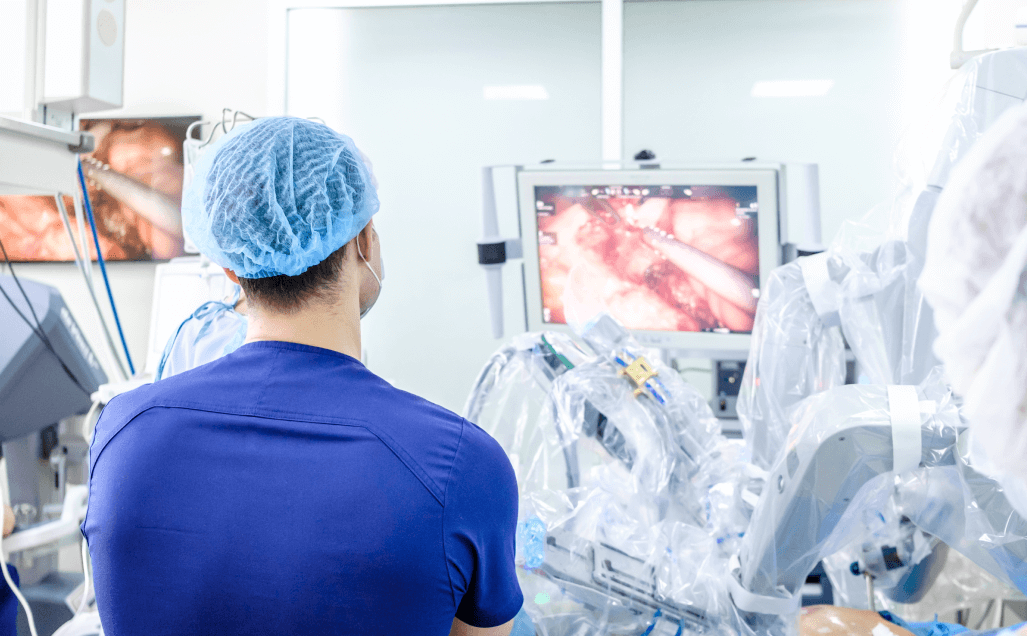General & Bariatric Surgery

General & Bariatric Surgery at Epic Care
According to the World Health Organization, 65% of the world’s population lives in countries where overweight and obesity kills more people than those who are underweight. About 500 million adults in the world are affected by obesity and one billion are affected by overweight, along with 48 million children.
Obesity is no longer considered a cosmetic issue that is caused by overeating and a lack of self-control. The World Health Organization, along with medical and scientific societies, now recognize obesity as a chronic progressive problem, resulting from multiple environmental and genetic factors and requiring lifelong treatment and control.
Losing weight and maintaining weight loss is difficult and fraught with setbacks. We understand this and treat obesity as a complex disease. We strive to provide our patients with care that is multidisciplinary, comprehensive, and, above all, compassionate. Our team is composed of individuals from various health care disciplines, including expert surgeons with specialized training in bariatric, metabolic, and gastrointestinal surgery. Together, we provide the support you need to help achieve your weight loss goals.
To meet with one of our Bariatric Surgeons, call the location nearest you for an appointment.
General & Bariatric Surgery
Obesity has become a severe problem in the United States and worldwide. Unfortunately, diet, exercise, and medications alone are often not sufficient in achieving long-standing weight loss. The first bariatric procedure was performed in 1954 by Dr. Kremen and his associates. Since this first procedure, various bariatric surgical procedures have been developed and different technologies have been utilized. With these improved surgical procedures and technologies, an increasing number of patients have been turning to bariatric surgery as a weight loss tool.
Bariatric surgery helps achieve long-standing weight loss by restricting the amount of food the stomach can hold (restrictive surgery) and/or by altering the gastrointestinal tract leading to decreased absorption of nutrients (malabsorptive surgery).
Each type of bariatric surgery has its own advantages and disadvantages. At your consultation, you and your surgeon will discuss which surgery is best for you.
Gastric Bypass
Gastric bypass, or Roux-en-Y gastric bypass, is both a restrictive and malabsorptive bariatric procedure. First, a small stomach (gastric) pouch is created from the top part of the stomach. This pouch decreases the size of the stomach and reduces the amount of food that can be eaten. Next, the small intestine is divided and a portion of it is bypassed so that food is diverted past the majority of the stomach and a portion of the small intestine, leading to malabsorption.
Sleeve Gastrectomy
Sleeve gastrectomy, or vertical sleeve gastrectomy, is a type of restrictive bariatric procedure. In this procedure, the stomach is divided along its vertical length in order to create a slender gastric tube which looks like a sleeve or banana. The excess stomach is removed. The gastrointestinal tract is otherwise not altered. As a result, patients feel full after eating much less. The amount of food consumed is limited, but their absorption is not affected.
Adjustable Gastric Banding
Adjustable Gastric Banding, often called the “Lap band,” is a type of restrictive bariatric procedure. In this procedure, an adjustable inflatable band is placed around the upper part of the stomach. This creates a small stomach pouch at the top of the stomach, which limits the amount of food that a patient may consume. The band also creates a small opening at the lower part of the pouch which leads to a delay in food emptying and helps to promote a sense of fullness.
Revisional Bariatric Surgery
The bariatric and metabolic surgeons at Epic Care have all undergone specialized fellowship training in advanced minimally invasive and bariatric surgery. Because of this level of expertise, our surgeons are skilled to perform revisional bariatric surgeries, such as the following:
- Gastric Band Removal with Conversion to Sleeve Gastrectomy or Gastric Bypass – Some patients are dissatisfied with the weight loss after the adjustable gastric band or have complications from band slippage or erosion, heartburn, or difficulty swallowing food. These patients may be candidates for removal of the band with conversion to a sleeve gastrectomy or gastric bypass. In these procedures, the gastric band and port is removed and either a sleeve gastrectomy or gastric bypass is performed
- Revision of the Gastric Pouch and/or Gastrojejunostomy after Gastric Bypass – Occasionally, the gastric pouch of gastric bypass can become enlarged or stretched. When this happens, there is a decreased sense of fullness and restriction which was present after the initial gastric bypass. This can contribute to weight regain. If a dilated gastric pouch is found, we reintroduce our patients to the Bariatric Dietitians, Therapist and Support Groups for education and support to ensure healthy diet and exercise habits. These patients may be candidates for revisional surgery to reduce the size of the gastric pouch.
Minimally Invasive Surgery
All of the bariatric procedures are performed using minimally invasive techniques, unless there is an anatomical or medical reason that a minimally invasive surgery cannot be performed. When bariatric procedures were first developed, they were performed using a large midline incision. Over time, minimally invasive techniques, both laparoscopic and robotic, have been developed where surgery can be performed through small incisions (5 to 12 millimeters in size) using a thin camera and instruments. Studies have shown that minimally invasive surgery offers many benefits compared to traditional open surgeries – less pain, improved lung function, smaller scars, fewer wound complications, shorter hospital stay, and faster recovery.
All of our surgeons have received specialized training in bariatric and metabolic surgery and can perform Bariatric procedures robotically. Robotic surgery, similar to laparoscopic surgery, is performed through small incisions using a thin camera and instruments to perform the surgery. The “Robot” is fully controlled by the surgeon and not acting on its own. There are several advantages of robotic surgery including 3D (or 3 dimensional) vision, enhanced precision with wristed instruments (giving fine steady movements of the human hand in the size of a pencil tip), and full control over the camera and three robotic instrument arms.
Start Your Weight Loss Journey Today
To start your weight loss journey today, contact one of our expert bariatric coordinators to schedule a consult at a location nearest you and attend one of our free weight loss seminars.
Studies have shown that Bariatric Surgery offers patient significant health benefits. You may be a candidate for bariatric surgery if you have a Body Mass Index (BMI) greater than or equal to 35 with one or more significant obesity-related conditions including, but not limited to high blood pressure, diabetes, sleep apnea and high cholesterol. If you have a BMI greater than or equal to 40, you may be considered a candidate regardless of the presence of any other medical condition.
Bariatric Surgery Pathway
Our team is dedicated to helping you achieve your weight loss goals and you are an extremely important member of the team. We are fully committed to helping you be successful, but you will need to be fully committed as well. These are the steps involved in the bariatric surgery process.
Education
The first step in the bariatric surgery process is to obtain more education about bariatric surgery. Prospective patients should attend a Weight Loss Surgery informational seminar. These seminars are led by our bariatric surgeons and will provide you with information about bariatric surgery. You will learn more about the different types of bariatric surgeries and will have the opportunity to ask any questions that you may have regarding bariatric surgery. Through these seminars, we hope to help you find out if bariatric surgery is right for you. For a free Bariatric Surgery seminar at a hospital near you, click on the links below:
To watch a pre-recorded seminar provided by San Ramon Regional, click here.

Medical Weight Loss
Depending on your insurance, you may be required to participate in a supervised weight-management program prior to your surgery. These programs must include monthly documentation of weight, current dietary regimen, and physical activity.
Studies have shown that there are many benefits to pre-operative weight loss and education. In addition to health benefits, other benefits include:
- Reduced surgical complications
- Improved percent weight loss after bariatric surgery
- Facilitation of laparoscopic approach
- Shorter operative times
Preparing for Surgery
Before you have surgery, you will need to have consultations with various health care professionals to determine if you are a good candidate for bariatric surgery. These include a dietician or nutritionist and a psychologist specializing in bariatrics. If you have heart and/or lung disease, you may also need to see a pulmonologist and/or cardiologist prior to surgery. You will also need to undergo pre-surgery testing and lab work prior to your surgery.
Recovery
Although Bariatric Surgery can be very effective in treating obesity, it is only a tool that can help patients achieve long-lasting weight loss success. Patients who undergo bariatric surgery still need to continue on a weight loss program. Patients need to adjust eating behaviors after bariatric surgery and also make the lifestyle changes needed to achieve weight loss.
Following surgery, most patients stay in the hospital 1 to 2 nights. While in the hospital, the Bariatric Dietitian will visit you to review diet recommendations and answer any questions. Most patients have mild pain which is well controlled with the pain pills prescribed for you. Once you get home, we encourage you to walk frequently and drink adequate amounts of fluid to keep hydrated. Depending on what you do for work, most patients can return to work one to three weeks after surgery.
Our team at Epic Care is dedicated to helping you in achieving successful and long-lasting weight loss. Close follow-up with your bariatric surgeon and care team is essential. Following your surgery, you will visit with your bariatric surgeon and other members of the care team on a regular basis.
We also encourage patients access to support groups to help them in their recovery. Through these support groups, you will meet other bariatric surgery patients who are different points in their weight loss journey.
Intragastric Balloon
To provide a range of weight loss options, our surgeons also offer non-surgical treatment of obesity with intragastric balloons. Ideal candidates have a BMI 30-40 kg/m2.
Orbera is an FDA-approved gastric balloon which is placed into the stomach during a 30 minute endoscopic procedure where a flexible camera scope is inserted through the mouth and into the stomach. The balloon is placed in the stomach and then filled with fluid until it is about the size of a grapefruit. By taking up space in your stomach, Orbera helps a patient to eat smaller meals, thus promoting proper portion control. This is a one part of a two-part program which is coupled with Orbera Coach, a healthy diet and exercise program with regular meetings with a trained dietitian. The goal of Orbera is to teach healthy lifestyle habits to promote long term weight loss. The balloon is removed after 6 months, but the Orbera Coach program continues for a total of 1 year.
For more information about Obera intragastric ballon, click here.
- Patients generally lose more weight than with diet and exercise alone
- The procedure only takes 20-30 minutes
- Less invasive – no incisions and no scarring
- Patients can generally go home the same day
- Intended for adults with a BMI of at least 30 to 40
Disadvantages of Intragastric Balloons
Requires a 12-month commitment – balloon placement and adherence to a healthy diet and exercise plan. If you do not maintain a diet and exercise plan, there may be little to no weight loss at all
Intragastric balloon is intended for individuals with a BMI of 30 to 40 kg/m2. For patients who have not been able to lose weight with traditional weight loss methods, but don’t qualify for (or want) bariatric surgery. If this describes you, call our office today to make an appointment and meet with one of our Bariatric Surgeons.
(925) 338-8511 for our Walnut Creek, Concord and San Ramon offices





 Happy Independence Day!
Happy Independence Day! 











